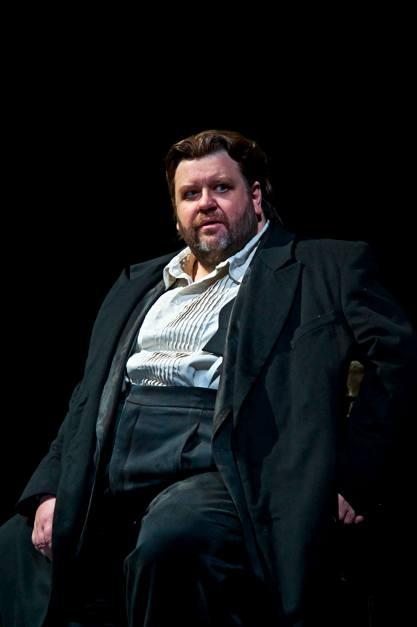The double standards in opera are amazing. If heldentenor Johan Botha - a man the size of a small Eastern European country - had been a woman, he would have been refused re-entry to the stage till he'd had a gastric band fitted. But his size was the least of our worries. For those of us who vainly cling to the idea of opera as a viable dramatic art form, Botha's return to Covent Garden as Tannhäuser was one of the most profoundly depressing experiences of my life.
For most of the first two acts Botha might as well have been a stuffed bear on wheels. He paced from stage right to stage left to stage right with so few discernible human qualities I thought he might be Susan Boyle. All of which should have been set at naught. Irrelevant. Beneath the concerns of a critic - as I'm sure you'll all speedily point out. Botha is after all, first and foremost, a singer. It is with his voice that he should indicate and carve out presence, character and movement. It is with his voice that he can transcend - as so many have - physical awkwardness and oddity. It is with the voice that opera becomes a viable dramatic art form. And it was with his voice that the good ship HMS Botha ultimately grounded itself.
Was there something wrong? Technically speaking nothing seemed awry. He had all the huff and puff - and by golly, does one need a lot of huff and puff for this role - required to sustain the performance. Yet the translation of this huffing and puffing into emotion or storytelling was so pronounced by its absence that one started to think there must be something up. Too much control was my conclusion as to what was up. The valve to his soul had been sealed shut.
So with Botha on the bench for much of the game this production was always going to be more than a little lame. A Tannhäuser without Tannhäuser is a bit like a house without a door. Access is tricky. So we tried a few windows. The easiest way in normally is through the Venusberg, which last night was the Royal Opera House. Quite literally. Director Tim Albery had replicated the Royal Opera House's proscenium arch, stage and curtain behind the proscenium arch, stage and curtain. Here, on the stage that lay on stage the debauchery began. Thrillingly choreographed by Jasmin Vardimon, poshly dressed dancers flung their bodies - and the chairs and table - in back-breaking wave-like shapes, deconstructing their refined reality, mirroring the sexual flipping and flopping of the musical start. It was the highlight of an overly conceptual and incoherent production.
Michaela Schuster's Venus couldn't quite match up to the seductions of the dancers, though she tried her best. It isn't easy I imagine trying to seduce a supporting wall. Or was that Botha? Difficult to tell. Many of us hoped that Eva-Maria Westbroek's Elisabeth would be the one to open up the opera. And to an extent she did. She filled out her character as much as Botha thinned his so that we got far more than the pitiable cipher that Wagner's drama offers up on paper. In a way her irreproachably fair, virtuous and humane qualities are so much more attractive than the suburban seductions of Schuster's Venus that there's not much of a dramatic contest for Botha's Tannhäuser.
So our search for an entry to the soul of this work - I felt like Parsifal, I did - continued. Few of the Minnesingers - Tannhäuser's fellow warrior-artists - shone very brightly. But then came Christian Gerhaher's Wolfram von Eschinbach (pictured right with Westbroek's Elisabeth). In him, one had a soulmate, someone to admire and believe in and cry for, and a voice - gauzy, flickering, Lieder-like in sensitivity - that always teetered beguilingly on the cusp of a speaking voice. Modesty, selflessness and unrequited love are his lot. Gerhaher delivered his overshadowed but important story - he is a John the Baptist figure to Elisabeth's Jesus - with immense subtlety and quiet power. His "Song to the Evening Star" was shattering.
Gerhaher's contribution wouldn't have been enough, however, to carry the whole four-and-a-half-hour evening. For this one relied on a hero in the pit, conductor Semyon Bychkov. The energy, the honesty, the flexibility of his instructions would have been enough. But he was also drawing the most divine beauty from each and every musician. Each break-away solo or chamber-like melodising from the clarinet, violin, cello, horns or the flutter-tonguing flutes glistened with unalloyed joy. It reminded us that beneath all the musical fanfare of Wagner is a great miniaturist. Some of the most captivating moments of the evening came from Wagner's frequent retreat into small forces, especially those that accompany Gerhaher.
The musicality of Bychkov, Gerhaher and Westbroek and the now rousing, now stilled choir more than made up for the work's dramatic limitations. On which subject, ladies and gents, time for some plain-speaking. Early Wagner it may be but as a play Tannhäuser is still unforgivably embarrassing: unidirectional in its thrust, clunking in its exposition of Christian catechism - read Pope Benedict XVI's excellent encyclical Deus Caritas Est for an infinitely more sophisticated (and arguably more dramatic) take on the same dilemma - and horribly stilted in its unravelling. And you won't even begin to be able to iron out these mammoth creases if you start with a dalek as your leading man.
- Tannhäuser at the Royal Opera House until 2 January, 2011
- See what's on at the Royal Opera House 2010-11















Add comment